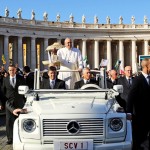 On the day of Pope Francis’ election, a good friend of mine (who is not Catholic) posted a link to a 2 year old Guardian news story discussing (then) Cardinal Bergoglio’s purported complicity in human rights violations:
On the day of Pope Francis’ election, a good friend of mine (who is not Catholic) posted a link to a 2 year old Guardian news story discussing (then) Cardinal Bergoglio’s purported complicity in human rights violations:
“The extent of the church’s complicity in the dark deeds was excellently set out by Horacio Verbitsky, one of Argentina’s most notable journalists, in his book El Silencio (Silence). He recounts how the Argentine navy with the connivance of Cardinal Jorge Bergoglio, now the Jesuit archbishop of Buenos Aires, hid from a visiting delegation of the Inter-American Human Rights Commission the dictatorship’s political prisoners. Bergoglio was hiding them in nothing less than his holiday home in an island called El Silencio in the River Plate.”
It later turned out that the story was incorrect and the newspaper’s website now lists the following correction:
This article was amended on 14 March 2013. The original article, published in 2011, wrongly suggested that Argentinian journalist Horacio Verbitsky claimed that Cardinal Jorge Bergoglio connived with the Argentinian navy to hide political prisoners on an island called El Silencio during an inspection by human rights monitors. Although Verbitsky makes other allegations about Bergoglio’s complicity in human rights abuses, he does not make this claim. The original article also wrongly described El Silencio as Bergoglio’s “holiday home”. This has been corrected.
To my friend’s credit, he noted the paper’s correction immediately (even before I had a chance to comment) and he had some choice words for the poor journalism involved.
But the series of actions made me reflect on the role of the modern media in shaping opinions about the Pope, and even more importantly, on the sense of distrust that pervades the Catholic Church scene. Sociologically, I recognize many of the historical events and circumstances that have lead to this state of affairs (along with the competing interests and worldviews that perpetuate it), but that doesn’t mean I have to like it, and it doesn’t mean that I can’t work to change it.
Paraphrasing a famous John Lennon song, I pray that we all “Give the Pope A Chance.”
In my sociology course, I have tried to show my students that our collective imagination can be hugely important in determining the course of history, because beliefs have consequences. If we cannot even imagine something, then how will we ever accomplish it? Can we, collectively, imagine a Church and a Pope that we trust?
I don’t want and am not asking for blind obedience from Catholics or a “sweeping under the rug” and forgetting among non-Catholics, and there are real and important questions to deal with in examining Argentina’s “dirty war.” But I know that we also must develop a hermeneutic of generosity to balance out the modern hermeneutic of suspicion that pervades our modern thinking.